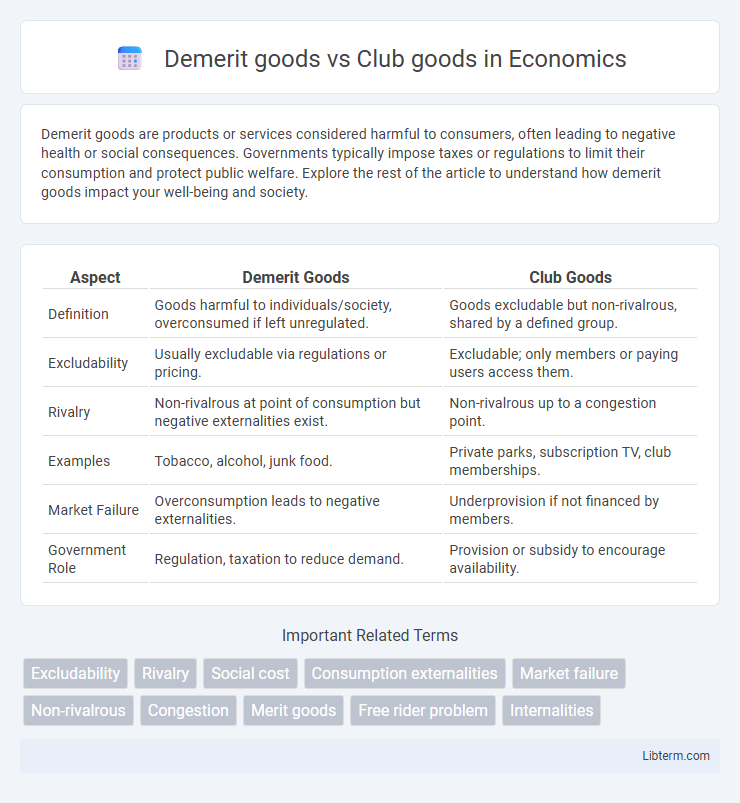Demerit goods are products or services considered harmful to consumers, often leading to negative health or social consequences. Governments typically impose taxes or regulations to limit their consumption and protect public welfare. Explore the rest of the article to understand how demerit goods impact your well-being and society.
Table of Comparison
| Aspect | Demerit Goods | Club Goods |
|---|---|---|
| Definition | Goods harmful to individuals/society, overconsumed if left unregulated. | Goods excludable but non-rivalrous, shared by a defined group. |
| Excludability | Usually excludable via regulations or pricing. | Excludable; only members or paying users access them. |
| Rivalry | Non-rivalrous at point of consumption but negative externalities exist. | Non-rivalrous up to a congestion point. |
| Examples | Tobacco, alcohol, junk food. | Private parks, subscription TV, club memberships. |
| Market Failure | Overconsumption leads to negative externalities. | Underprovision if not financed by members. |
| Government Role | Regulation, taxation to reduce demand. | Provision or subsidy to encourage availability. |
Introduction to Demerit Goods and Club Goods
Demerit goods, such as tobacco and alcohol, are products that can cause negative externalities and are often overconsumed, leading to social costs like health problems and increased public expenditure. Club goods, including private parks and subscription-based services, are non-rivalrous but excludable, meaning consumption by one individual does not reduce availability to others, yet access can be restricted. Understanding the distinction between demerit goods, which lead to overconsumption without regulation, and club goods, managed to balance exclusivity and shared benefits, is crucial in economic policy and resource allocation.
Defining Demerit Goods
Demerit goods are products or services that society deems harmful or undesirable due to their negative impact on consumers' health or well-being, often leading to overconsumption if left unregulated. Common examples include tobacco, alcohol, and recreational drugs, which governments may restrict or tax to reduce demand. In contrast, club goods are excludable but non-rivalrous, such as subscription-based services or private parks, providing benefits to a specific group without diminishing availability to others.
Characteristics of Club Goods
Club goods exhibit characteristics such as excludability and non-rivalrous consumption up to a certain capacity, meaning users can be prevented from accessing them, but one person's use does not reduce availability for others until congestion occurs. These goods often require membership or subscription fees, exemplified by private parks, subscription-based streaming services, and golf clubs. Unlike demerit goods, which cause social harm and are often overconsumed, club goods provide shared benefits within a controlled group, balancing exclusivity and joint usage.
Key Differences Between Demerit and Club Goods
Demerit goods, such as tobacco and alcohol, generate negative externalities and are often over-consumed without government intervention, while club goods like private parks or subscription-based streaming services are excludable and non-rivalrous, providing benefits only to paying members. Unlike demerit goods, club goods do not produce harmful social effects and are efficiently supplied by private entities due to their excludability. The key distinction lies in demerit goods' tendency to require regulation to correct market failure, whereas club goods rely on membership fees to manage consumption and access.
Examples of Demerit Goods
Demerit goods include substances and activities like tobacco, alcohol, and recreational drugs, which impose negative externalities on individuals and society. These goods often lead to health problems, addiction, and public costs, justifying government intervention through taxes, regulations, or bans. Unlike club goods, which are non-rivalrous and excludable services like private parks or subscription-based streaming, demerit goods carry inherent social costs that reduce overall welfare.
Examples of Club Goods
Examples of club goods include private parks, subscription-based streaming services, and gated communities, where access is restricted to paying members. These goods are non-rivalrous up to a point, meaning multiple users can enjoy the service without reducing its availability to others, but they are excludable as non-members cannot access them. Unlike demerit goods such as tobacco or alcohol, which are considered harmful and overconsumed, club goods provide shared benefits and controlled access that promote exclusivity and collective enjoyment.
Economic Impacts of Demerit Goods
Demerit goods, such as tobacco and alcohol, impose negative externalities on society by increasing healthcare costs, reducing workforce productivity, and burdening public resources. These goods often lead to market failures as consumers underestimate their harmful effects, resulting in socially excessive consumption and economic inefficiencies. Government interventions, including taxes and regulations, aim to internalize these external costs and mitigate long-term economic impacts.
Social Implications of Club Goods
Club goods, characterized by excludability and non-rivalrous consumption up to a capacity limit, often promote social cohesion by providing shared benefits within defined groups, such as private parks or subscription services. Their social implications include potential exclusion of lower-income individuals, leading to inequality and restricted access to valuable resources or amenities. Unlike demerit goods, which negatively impact social welfare, club goods can enhance community well-being if managed to balance exclusivity with equitable access.
Policy Approaches Toward Demerit and Club Goods
Policy approaches toward demerit goods often involve regulation, taxation, or outright prohibition to reduce consumption due to their negative externalities, such as health warnings on tobacco or sin taxes on alcohol. In contrast, club goods--characterized by excludability and non-rivalry up to a point--are typically managed through membership fees or subscription models to balance access and funding, ensuring sustainability without congestion. Governments may also subsidize club goods like public parks or cable services to promote equitable access while maintaining quality and preventing overuse.
Conclusion: Evaluating Demerit and Club Goods
Demerit goods, such as tobacco and alcohol, often require regulation due to their negative externalities and potential harm to society. Club goods, including private parks or subscription services, are characterized by exclusivity and non-rivalrous consumption up to a capacity limit, promoting efficient use among members. Evaluating these goods highlights the need for targeted policies: controlling demerit goods to mitigate social costs while managing club goods to balance access and resource sustainability.
Demerit goods Infographic

 libterm.com
libterm.com